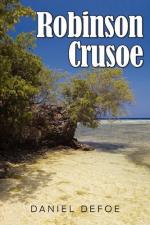|
This section contains 5,946 words (approx. 20 pages at 300 words per page) |

|
SOURCE: "Robinson Crusoe," in Defoe and the Uses of Narrative, Rutgers University Press, 1983, pp.25-65.
In the excerpt below, Boardman considers some of the differing views of the meaning of Robinson Crusoe and argues that Defoe uses a threefold narrative strategy incorporating reportorial, personal, and interactive techniques.
Employing a Metaphor, as was his wont, to describe narrative unity, Henry James likens The Tragic Muse to "some aromatic bag of gathered herbs of which the string has never been loosed."1 The question of the final fragrance of the bouquet garni known as Robinson Crusoe continues to puzzle at least those students of narrative for whom deconstruction has not invalidated the whole enterprise. Clearly, any theory of narrative development concerned with wholes rather than parts, or even with the possibility of making wholes from parts, must consider the question, as well as the additional complication suggested by James's insistence on...
|
This section contains 5,946 words (approx. 20 pages at 300 words per page) |

|


